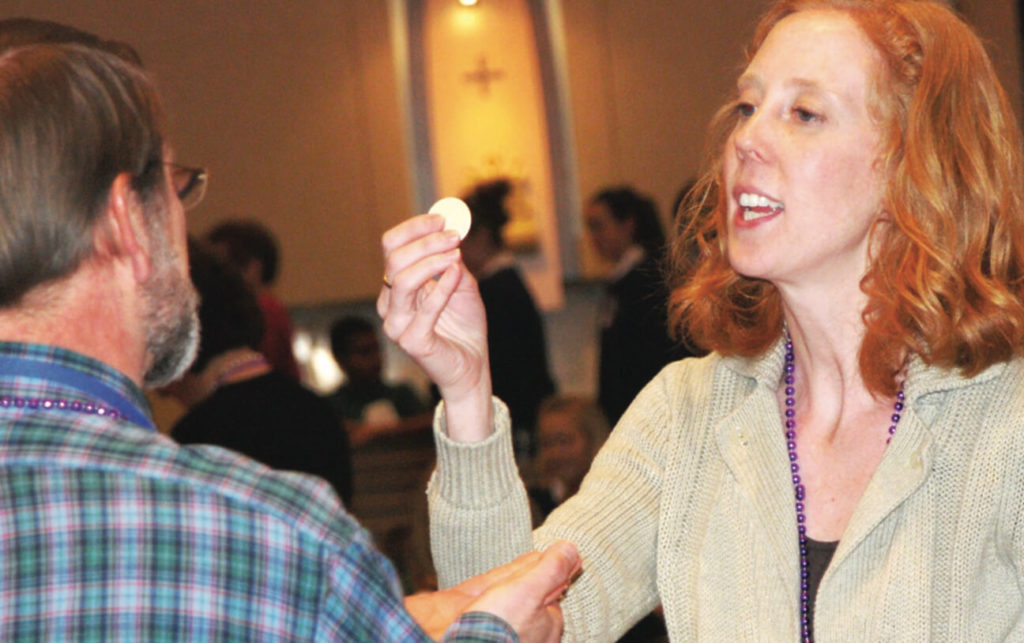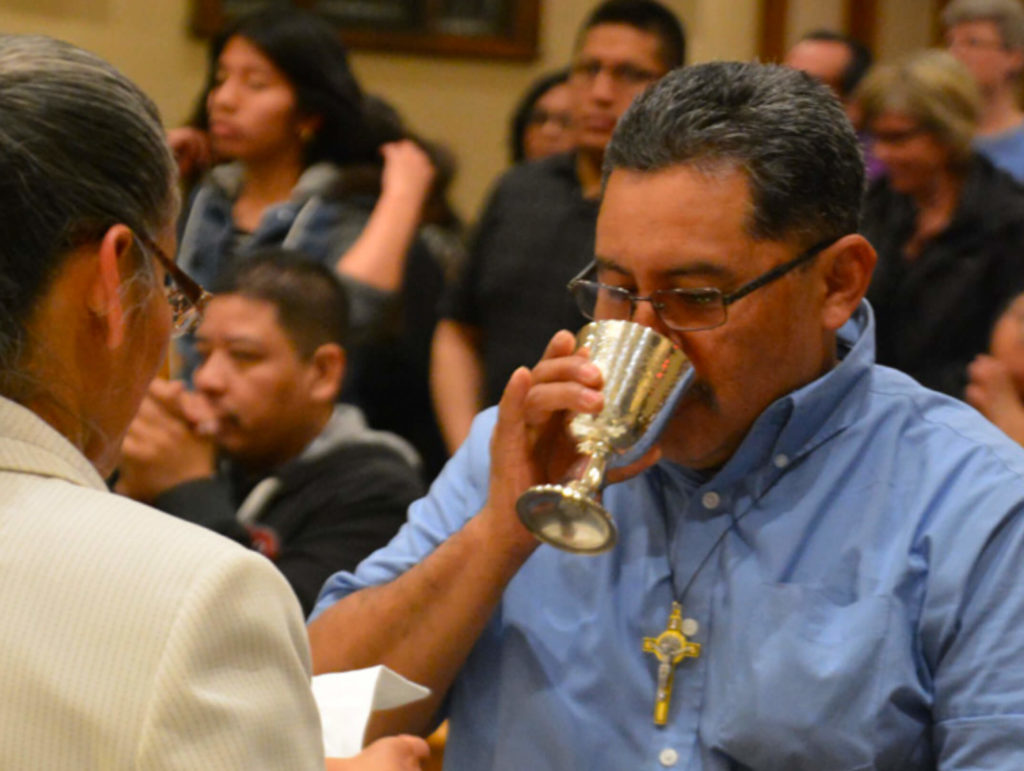John’s gospel, the one that evolved longest before being written down in the A.D. 90s or later, tells only of Jesus’ washing his friends’ feet at their last supper together, not of sharing bread and wine. Instead, the fourth gospel carefully places its reflection on the Body and Blood of Christ in chapter 6, which centers in Jesus’ words, “I am the bread of life.”
Chapter 6 begins with a sign, John’s term for a miracle. Jesus feeds a crowd so large that the disciple Philip explains it would take six months’ wages to buy the food. Jesus takes a boy’s two fish and five barley loaves, gives thanks, and feeds the crowd this everyday fare of the poor. His disciples gather 12 baskets of leftover bread fragments; the bread becomes more abundant in being shared.
The 12 baskets are a symbol.
Twelve is the number of the original tribes of Israel. The disciples who gathered the
12 baskets represent the new community of Israel. The baskets of food are ready to share and multiply down the centuries into an abundance for all, including us who gather in Jesus’ name.
- What does this feeding sign say to you?
As Sunday’s gospel passage begins, Jesus contrasts himself with the manna Israel’s ancestors ate but died. “The bread that I will give for the life of the world is my flesh,” he says. The word flesh repels Jesus’ hearers. They object, “How can this man give us his flesh to eat?” Six times in Sunday’s gospel Jesus insists believers must eat his flesh and drink his blood. Why does the narrative press repeatedly such an extreme and disturbing literalism?
In John’s gospel Jesus deliberately draws people into dialog through misunder- standing. In this case Jesus offends and intrigues his listeners by stating that his flesh will be bread for the life of the world.
Faith can begin in misunderstanding. We misunderstand Jesus if we think the eating bread and drinking wine that Christians do are cannibalism. However, Jesus did choose eating and drinking as the signs through which his followers can identify with him, with his whole self, with his wholehearted giving of himself in his death. When we eat and drink, the food and drink become part of us and nourish us. In this sacrament of faith Jesus becomes part of us. His self-giving act of love becomes our real, nourishing, and transforming food.
I taught catechism to middle grade kids. One Sunday we read the gospel about Jesus, after his resurrection, appearing to his friends in Galilee. They had gone fishing and weren’t catching a thing. Jesus called to them from the beach and suggested trying the other side of the boat. They got so many fish their nets almost broke. “That man is Jesus,” John whispered to Peter. When they got to shore, Jesus was cooking fish over a little fire.
“Why did John think it was Jesus?” I asked the kids.
“Because of all the fish,” they said.
“Anything else?” I asked.
“Because he made breakfast for them,” one girl said. “Jesus always ate with his friends.”
Jesus always ate with his friends, and so do we. That is what makes us Catholic.
- How has participating in Eucharist nourished and transformed you?
- What have you learned during the Covid-19 epidemic about being the Body of Christ in the Fworld for those in need?
For John, those who do not eat and drink the signs of Jesus’ self-giving love are not in relationship with him. They do not have eternal life. They will not be raised up on the last day. They do not abide in him nor he in them. They do not live because of Jesus.
John’s gospel equates faith in Jesus with faith in Jesus’ signs. Faith that this blood is real drink and this flesh is real food is the same as faith Jesus is really from God.

Eucharist is a performative sign, a commitment we live out. Jesus is bread broken for the life of the world. To share the Body of Christ in this sacrament is to commit to give one’s self for the life of the world as Jesus did.
In making a cup of wine the pledge of pouring out his lifeblood for us, Jesus makes the wine our means of pledging commitment and faith. Jesus makes broken bread a sign of himself in his total act of self- giving on the cross. To eat this bread and make it part of us is to make faith in Jesus our sustenance.
Our community isn’t just fellowship. It is gathering to put our own offering of our lives on the same altar as Jesus. It is to say, “This is my body given for you.” It is to join the line of people receiving nourishment from the hands of each other.
It takes the whole Christian community to remember Jesus’ gift of himself and to make him present today. Each of us is the feast of Corpus Christi, a source of blessing and nourishment and revelation of Jesus’ good news to those we meet today and this week.
- What is the most life-changing Eucharist you have experienced?

